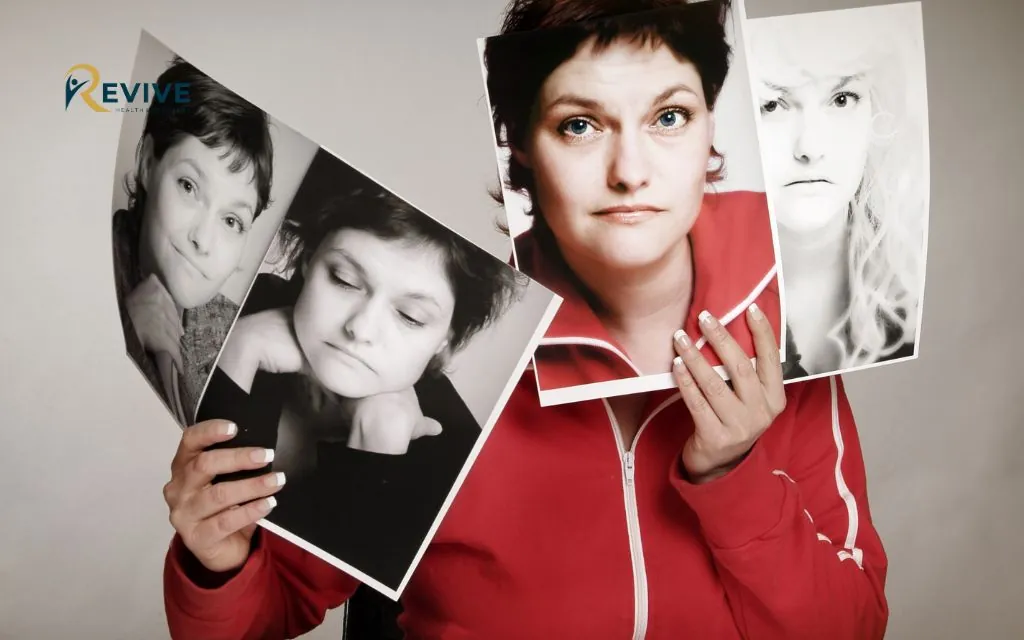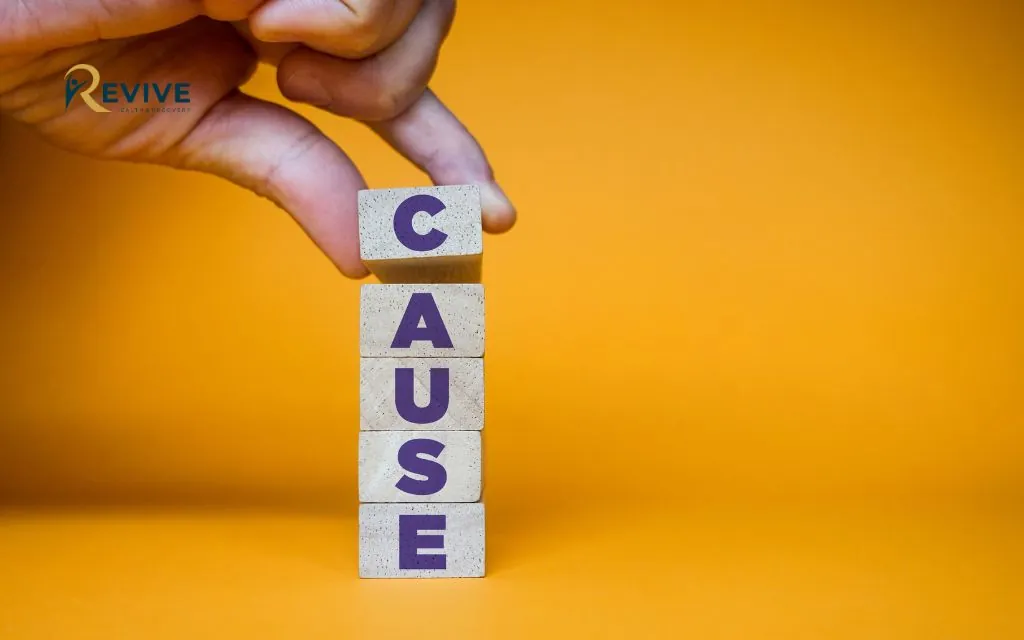Are you concerned about persistent patterns of behavior in yourself or a loved one that seem to cause significant distress? Do relationships, work, and daily functioning seem unusually challenging? You might be encountering signs of a personality disorder – mental health conditions that affect approximately 9% of U.S. adults and require specialized treatment approaches. At Revive Health Recovery, we understand the complexity of these conditions and offer comprehensive support for Denver residents seeking answers for holistic mind care and effective care.
Understanding Personality Disorders: Beyond Difficult Behavior
What Defines a Personality Disorder: Core Characteristics
Personality disorders are more than just difficult personality traits – they represent enduring patterns of inner experience and behavior that deviate significantly from cultural expectations. These patterns are inflexible, pervasive across different situations, and lead to distress or impairment in important areas of functioning.
“Personality disorders involve rigid, maladaptive personality traits that are marked enough to cause significant distress or to impair work and/or interpersonal relationships,” according to the Merck Manual’s definition, highlighting the profound impact these conditions can have on daily life. Merck Manuals
What distinguishes personality disorders from temporary emotional states or reactions is their long-term stability. These patterns typically begin in adolescence or early adulthood and persist throughout life without appropriate intervention and treatment.
The Three Clusters of Personality Disorders in the DSM-5
The Diagnostic and Statistical Manual of Mental Disorders (DSM-5), published by the American Psychiatric Association, classifies personality disorders into three distinct clusters based on shared characteristics:
Cluster A (Odd or Eccentric):
- Paranoid Personality Disorder: Persistent distrust and suspicion
- Schizoid Personality Disorder: Detachment from social relationships
- Schizotypal Personality Disorder: Acute discomfort in close relationships with unusual beliefs and behaviors
Cluster B (Dramatic, Emotional, or Erratic):
- Antisocial Personality Disorder: Disregard for others’ rights
- Borderline Personality Disorder: Instability in relationships, self-image, and emotions
- Histrionic Personality Disorder: Excessive emotionality and attention-seeking
- Narcissistic Personality Disorder: Pattern of grandiosity, need for admiration, and lack of empathy
Cluster C (Anxious or Fearful):
- Avoidant Personality Disorder: Social inhibition, feelings of inadequacy
- Dependent Personality Disorder: Submissive, clinging behavior related to need to be taken care of
- Obsessive-Compulsive Personality Disorder: Preoccupation with orderliness, perfectionism, and control
Each cluster represents a different constellation of symptoms and behavioral patterns, requiring specialized approaches to treatment and management.

Prevalence and Impact: Personality Disorders in Colorado
Colorado faces unique challenges in addressing mental health needs, including personality disorders. According to recent data, Colorado ranks 46th in the nation for overall mental health care, reflecting significant gaps in access to appropriate treatment options.
More concerning is the rising trend in mental health challenges across the state. The Colorado Health Institute reported that more than one in four Coloradans reported poor mental health in 2023—the highest number ever measured in the state. Colorado Health Institute
Denver’s distinctive urban-wilderness dynamic creates a unique environment that can influence how personality disorders manifest and are treated. The combination of urban stressors and the isolation that can occur in more remote areas creates complex challenges for those living with personality disorders in Colorado.
Recognizing the Warning Signs of Different Personality Disorders
Cluster A: Identifying Odd or Eccentric Patterns
Recognizing personality disorders in the “odd or eccentric” cluster requires attention to subtle but persistent patterns:
- Paranoid Personality Disorder: Look for consistent suspicion of others’ motives without sufficient basis, reluctance to confide in others due to fear of information being used against them, and bearing grudges for extended periods.
- Schizoid Personality Disorder: Watch for a pattern of detachment from social relationships, restricted emotional expression, and apparent indifference to praise or criticism from others.
- Schizotypal Personality Disorder: Note unusual beliefs or magical thinking, odd thinking and speech patterns, suspiciousness, inappropriate or constricted affect, and significant social anxiety that doesn’t diminish with familiarity.
These patterns must be consistent across situations and cause significant impairment in social or occupational functioning to be considered potential indicators of a personality disorder.
Cluster B: Spotting Dramatic, Emotional, or Erratic Behaviors
Cluster B personality disorders often present with more visible and dramatic symptoms that can significantly impact relationships and daily functioning:
- Borderline Personality Disorder: Look for a pattern of unstable relationships, frantic efforts to avoid abandonment, identity disturbance, impulsivity, recurrent suicidal behavior or self-harm, emotional instability, chronic feelings of emptiness, inappropriate anger, and stress-related paranoia.
- Antisocial Personality Disorder: Watch for consistent disregard for social norms and laws, deceitfulness, impulsivity, irritability and aggressiveness, reckless disregard for safety, consistent irresponsibility, and lack of remorse.
- Histrionic Personality Disorder: Note excessive emotionality and attention-seeking, discomfort when not the center of attention, rapidly shifting and shallow expressions of emotion, consistently using physical appearance to draw attention, impressionistic and vague speech, and considering relationships more intimate than they actually are.
- Narcissistic Personality Disorder: Observe grandiose sense of self-importance, preoccupation with fantasies of unlimited success or power, belief in being “special,” requiring excessive admiration, sense of entitlement, interpersonal exploitation, lack of empathy, envy of others, and arrogant behaviors or attitudes.
Denver personality disorder specialists often note that proper recognition of these conditions is crucial for effective treatment planning and support.
Cluster C: Noticing Anxious or Fearful Tendencies
Cluster C disorders can sometimes be mistaken for anxiety disorders, but their pervasive nature and impact on personality differentiate them:
- Avoidant Personality Disorder: Look for patterns of social inhibition, feelings of inadequacy, hypersensitivity to negative evaluation, avoidance of occupational activities involving significant interpersonal contact, unwillingness to get involved with people unless certain of being liked, viewing self as socially inept or personally unappealing, and reluctance to take risks or engage in new activities.
- Dependent Personality Disorder: Watch for excessive need to be taken care of, submissive and clinging behavior, difficulty making everyday decisions without excessive advice, difficulty expressing disagreement, going to excessive lengths to obtain support from others, feeling uncomfortable or helpless when alone, and urgently seeking another relationship when one ends.
- Obsessive-Compulsive Personality Disorder: Note preoccupation with orderliness, perfectionism, and control at the expense of flexibility and efficiency, excessive devotion to work and productivity, inflexibility about morality and ethics, inability to discard worn-out or worthless objects, reluctance to delegate tasks, adopting a miserly spending style, and rigidity and stubbornness.
Understanding how to recognize these signs of personality disorders in adults is essential for early intervention and appropriate treatment.
When Personality Traits Become Personality Disorders
The line between personality traits and personality disorders can sometimes seem blurry. Here’s what differentiates them:
- Inflexibility: While personality traits can adapt to different situations, personality disorders show rigid patterns that don’t adjust appropriately to varying circumstances.
- Pervasiveness: Personality disorders affect multiple domains of functioning, including cognition (ways of perceiving and interpreting self, others, and events), affectivity (emotional responses), interpersonal functioning, and impulse control.
- Distress or Impairment: Personality disorders cause significant problems in social, occupational, or other important areas of functioning.
- Stability Over Time: These patterns begin in adolescence or early adulthood and remain relatively stable throughout life without intervention.
- Cultural Context: The patterns must deviate markedly from the expectations of the individual’s culture to be considered a disorder.
Colorado mental health resources emphasize the importance of professional assessment to distinguish between normal personality variation and clinically significant personality disorders requiring treatment.

Personality Disorder Diagnosis in Denver: What to Expect
The Assessment Process: Types of Evaluations in Colorado
Receiving a personality disorder diagnosis involves a comprehensive evaluation process conducted by qualified mental health professionals:
- Clinical Interview: A detailed conversation about symptoms, personal history, and patterns of thinking, feeling, and behaving.
- Psychological Testing: Standardized assessments that help identify patterns consistent with personality disorders.
- Collateral Information: With permission, information from family members or close friends who can provide additional perspectives on behavioral patterns.
- Medical Evaluation: To rule out physical conditions that might contribute to symptoms.
- Structured Clinical Assessments: Specialized interviews designed specifically to diagnose personality disorders according to DSM-5 criteria.
In Denver, psychological assessment options range from comprehensive evaluations at specialized centers like Revive Health Recovery to assessments conducted by private practitioners. The thorough nature of these evaluations helps ensure accurate diagnosis and appropriate treatment planning.
Finding Qualified Mental Health Specialists in Denver
Denver offers a range of options for finding qualified specialists in personality disorder treatment:
- Psychiatric Services: Psychiatrists specializing in personality disorders can provide both diagnosis and medication management.
- Psychologists: Clinical psychologists with expertise in personality disorders offer comprehensive assessment and therapy.
- Licensed Therapists: Many therapists in Denver specialize in evidence-based treatments for personality disorders.
- Specialized Treatment Centers: Facilities like Revive Health Recovery offer comprehensive care specifically designed for personality disorders.
When seeking help, look for professionals with specific training and experience in personality disorders, as these conditions often require specialized approaches to treatment.
What Happens After Diagnosis: Creating a Treatment Plan
Following a personality disorder diagnosis, a comprehensive treatment plan typically includes:
- Psychotherapy: The cornerstone of treatment for most personality disorders, with specific approaches tailored to the particular diagnosis.
- Medication Management: While no medications specifically treat personality disorders, certain medications can help manage specific symptoms like impulsivity, anxiety, or mood instability.
- Skills Training: Learning specific coping skills to address emotion regulation, interpersonal effectiveness, distress tolerance, and mindfulness.
- Support Services: Connecting with appropriate community resources and support groups.
- Coordination of Care: Ensuring that all providers involved in treatment are working collaboratively.
At Revive Health Recovery, treatment plans are highly individualized, recognizing that each person’s experience with personality disorders is unique.
Navigating Insurance Coverage for Mental Health in Colorado
Understanding insurance coverage for personality disorder treatment in Colorado can be challenging:
- Parity Laws: Mental health parity laws require insurance companies to cover mental health conditions, including personality disorders, at the same level as physical health conditions.
- Coverage Variations: Despite parity laws, coverage details vary significantly between insurance plans, including which treatments are covered and for how long.
- Colorado Medicaid: For eligible individuals, Colorado Medicaid provides coverage for mental health services, though the extent of coverage for specialized treatments may vary.
- Sliding Scale Options: Many providers and treatment centers in Denver offer sliding fee scales for those with limited insurance coverage or financial constraints.
For specific information about coverage at Revive Health Recovery, we encourage reaching out directly to our team who can help navigate these complex systems.

Colorado-Specific Resources for Personality Disorder Support
Denver’s Specialized Treatment Centers and Programs
Denver offers several specialized resources for personality disorder treatment:
- Intensive Outpatient Programs (IOPs): Structured treatment programs that provide comprehensive care while allowing individuals to maintain daily activities.
- Partial Hospitalization Programs (PHPs): More intensive than IOPs, these programs provide structured treatment during the day with evenings at home.
- Specialized Therapy Groups: Many centers offer groups specifically focused on personality disorders and related challenges.
- Personality Disorder Recovery Centers: Facilities like Revive Health Recovery offer comprehensive programs specifically designed for personality disorders.
The unique advantage of seeking treatment in Denver is access to programs that understand the specific challenges of Colorado’s mental health landscape.
Support Groups and Peer Resources Throughout Colorado
Beyond professional treatment, peer support can be invaluable for those navigating personality disorders:
- NAMI Colorado Groups: The National Alliance on Mental Illness offers support groups for individuals with mental health conditions and their families.
- DBT Skills Practice Groups: Some organizations offer peer-led groups focused on practicing DBT skills.
- Online Communities: Various online forums and groups connect individuals with personality disorders for mutual support.
- Family Support Groups: Groups specifically for family members of individuals with personality disorders provide education and coping strategies.
These resources offer complementary support to professional treatment, creating a comprehensive network of care.
Crisis Intervention Services and Emergency Support
For times of acute distress, Colorado offers several crisis resources:
- Colorado Crisis Services: Available 24/7 via phone (1-844-493-8255), text (text TALK to 38255), or walk-in centers throughout the state.
- 988 Suicide and Crisis Lifeline: The national crisis line providing immediate support for mental health emergencies.
- Emergency Departments: For situations requiring immediate medical attention or safety concerns.
- Mobile Crisis Teams: In many Colorado communities, mobile teams can respond to mental health crises in homes or community settings.
Having these resources readily available is essential for comprehensive care, as personality disorders can sometimes involve periods of crisis requiring immediate intervention.
Online and Telehealth Options for Rural Colorado Residents
For those in rural areas of Colorado, access to specialized care has expanded through telehealth options:
- Virtual Therapy: Many providers now offer evidence-based treatments for personality disorders via secure video platforms.
- Online Skills Groups: Some programs provide DBT and other skills groups virtually, increasing accessibility.
- Telepsychiatry: Medication management available remotely for those who cannot easily access in-person appointments.
- Digital Resources: Apps and online programs that complement traditional therapy by supporting skills practice.
These telehealth options have significantly improved access to care throughout Colorado, making specialized treatment more available regardless of location.

Supporting Someone with a Personality Disorder in Denver
Effective Communication Strategies for Family Members
Supporting a loved one with a personality disorder requires specific communication approaches:
- Validate Emotions: Acknowledge the person’s feelings as real and important, even if you don’t understand or agree with them.
- Use Clear, Direct Communication: Avoid hinting, sarcasm, or ambiguous messages that might be misinterpreted.
- Focus on Behaviors, Not Character: Discuss specific actions rather than making generalizations about the person’s character.
- Practice Active Listening: Make eye contact, summarize what you’ve heard, and ask clarifying questions.
- Choose Times for Important Conversations Wisely: Discuss sensitive topics when everyone is calm rather than during moments of heightened emotion.
These strategies can significantly improve communication and reduce conflict in relationships affected by personality disorders.
Setting Healthy Boundaries While Maintaining Support
Establishing and maintaining boundaries is essential for healthy relationships when personality disorders are involved:
- Define Clear Limits: Be specific about what behaviors are acceptable and unacceptable.
- Communicate Boundaries Calmly: Express boundaries in a non-accusatory way, focusing on your needs rather than the other person’s flaws.
- Be Consistent: Enforce boundaries consistently to avoid confusion.
- Recognize the Difference Between Supporting and Enabling: Provide emotional support without protecting the person from the natural consequences of harmful behaviors.
- Have a Plan for Boundary Violations: Know in advance how you’ll respond if boundaries are crossed.
Learning to set healthy boundaries is often part of family therapy at centers like Revive Health Recovery, where families receive guidance specific to their situation.
Family Therapy and Education Programs in Colorado
Family involvement can significantly improve outcomes for those with personality disorders:
- Psychoeducation Groups: Programs that help families understand personality disorders, their causes, treatments, and prognosis.
- Family Therapy: Sessions that involve the individual and family members working together to improve communication and resolve conflicts.
- Skills Training for Families: Learning specific skills to support a loved one while maintaining personal wellbeing.
- Multi-Family Groups: Bringing together multiple families affected by personality disorders to share experiences and strategies.
Denver offers several programs specifically designed to support families affected by personality disorders, recognizing the crucial role family systems play in recovery.
Self-Care for Caregivers: Finding Your Own Support Network
Supporting someone with a personality disorder can be emotionally demanding, making self-care essential:
- Maintain Your Own Therapy: Consider individual therapy to process your experiences and develop coping strategies.
- Join Support Groups: Connect with others who understand the unique challenges of supporting someone with a personality disorder.
- Set Aside Time for Renewal: Regularly engage in activities that restore your emotional energy.
- Build a Support Team: Develop relationships with friends, family members, or community resources who can provide backup support.
- Learn About the Disorder: Understanding the condition can help reduce frustration and increase compassion.
At Revive Health Recovery, we recognize that supporting family members is a crucial component of effective treatment for personality disorders.

FAQs About Personality Disorders
How can I tell the difference between a personality disorder and normal personality traits in myself or a loved one?
The key differences lie in flexibility, pervasiveness, and impact. While everyone has personality traits, these typically adapt to different situations. Personality disorders involve inflexible patterns that cause significant problems across multiple areas of life (relationships, work, self-perception) and remain consistent over time. If you’re concerned, a professional evaluation at Revive Health Recovery can provide clarity through comprehensive assessment.
What makes Revive Health Recovery uniquely qualified to treat personality disorders in Denver?
Revive Health Recovery combines specialized expertise in personality disorders with a comprehensive approach that addresses the whole person. Our team includes professionals specifically trained in evidence-based treatments for personality disorders, and our programs are designed to address both the symptoms and underlying causes of these conditions. Our 24/7 availability and South Denver location make us particularly accessible to Denver residents seeking specialized care.
Does Colorado Medicaid cover treatment for personality disorders at Revive Health Recovery, and what options are available for the uninsured?
Revive Health Recovery works with various insurance plans, including Colorado Medicaid, which typically covers mental health services for diagnosable conditions like personality disorders. Coverage specifics depend on your particular plan. For uninsured individuals, we offer several options including sliding scale fees and payment plans to make treatment more accessible. For detailed information about your specific situation, please contact our admissions team at (303) 268-4655.
What is the relationship between trauma and personality disorders, and how is this addressed in treatment at Revive?
Research shows a strong correlation between childhood trauma and the development of personality disorders, with genetic factors determining vulnerability. At Revive Health Recovery, we incorporate trauma-informed care into all aspects of treatment, recognizing that addressing underlying trauma is often essential for healing. Our approach includes specialized trauma therapies when appropriate, always proceeding at a pace that feels safe for the individual.
How long does personality disorder treatment typically take at Revive Health Recovery, and what outcomes can realistically be expected?
Treatment duration varies based on individual needs, severity of symptoms, and treatment goals. While some clients see significant improvement within months, personality disorders often require longer-term treatment for lasting change. At Revive Health Recovery, many clients participate in more intensive treatment initially, then transition to less frequent maintenance sessions. Realistic outcomes include improved emotional regulation, healthier relationships, better impulse control, reduced self-destructive behaviors, and enhanced quality of life.
5 Reasons to Choose Revive Health Recovery for Personality Disorder Treatment
Specialized Expertise in Personality Disorder Treatment
Revive Health Recovery stands out in Denver for our specialized approach to personality disorders:
- Expert Clinical Team: Our staff includes professionals with extensive training and experience in personality disorder treatment.
- Evidence-Based Protocols: We utilize treatments with strong research support for personality disorders, including DBT, schema therapy, and other specialized approaches.
- Comprehensive Assessment: Our thorough evaluation process ensures accurate diagnosis and treatment planning.
- Ongoing Professional Development: Our team stays current with the latest research and techniques in personality disorder treatment.
- Experience With Complex Cases: We have extensive experience working with individuals who have personality disorders alongside other mental health or substance use concerns.
This specialized expertise ensures that each client receives care tailored to the specific challenges of their personality disorder.
Comprehensive, Individualized Treatment Plans
At Revive Health Recovery, we recognize that no two individuals with personality disorders are alike:
- Personalized Approach: Treatment plans are developed based on each person’s specific symptoms, history, strengths, and challenges.
- Multi-Modal Treatment: We integrate various therapeutic approaches to address all aspects of the disorder.
- Skill Development Focus: Our programs emphasize practical skills that support lasting change.
- Flexible Intensity Levels: We offer varying levels of care intensity to match each individual’s needs.
- Regular Plan Reviews: Treatment plans are continuously evaluated and adjusted based on progress and changing needs.
This individualized approach ensures that treatment addresses the unique manifestation of personality disorders in each client.
Convenient South Denver Location with 24/7 Support
Our location and accessibility set us apart in the Denver mental health community:
- Central South Denver Facility: Easily accessible at 1427 S Federal Blvd, Denver, CO 80219.
- 24/7 Crisis Support: Available around the clock for clients experiencing urgent concerns.
- Flexible Scheduling Options: We offer appointment times that accommodate work and family commitments.
- Telehealth Options: For those who cannot attend in-person sessions due to distance or other constraints.
- Comfortable, Welcoming Environment: Our facility is designed to create a sense of safety and comfort during treatment.
This accessibility ensures that support is available whenever and however it’s needed.
Integrated Approach to Co-occurring Conditions
Many individuals with personality disorders also experience other mental health or substance use concerns:
- Dual Diagnosis Expertise: Our team is skilled in treating personality disorders alongside conditions like depression, anxiety, PTSD, or substance use disorders.
- Coordinated Treatment: All aspects of care are integrated into a cohesive plan rather than treating conditions separately.
- Trauma-Informed Approach: Recognizing the high rates of trauma history in personality disorders, we incorporate trauma treatment when appropriate.
- Medical Collaboration: We work closely with medical providers when physical health concerns are present.
- Specialized Groups: We offer groups specifically designed for those with co-occurring conditions.
Commitment to Long-Term Recovery and Aftercare
We understand that recovery from personality disorders is a journey rather than a destination:
- Phased Treatment Approach: Our programs guide clients through stages of treatment, from stabilization to skills building to application in daily life.
- Robust Aftercare Planning: Every client leaves with a comprehensive plan for maintaining progress.
- Step-Down Programming: We offer less intensive options as clients progress in their recovery.
- Alumni Support: Opportunities to stay connected with the recovery community after formal treatment ends.
- Relapse Prevention Focus: We emphasize identifying triggers and developing strategies to prevent setbacks.
This long-term perspective supports lasting change rather than temporary symptom management.
Conclusion
Recognizing personality disorders is the crucial first step toward healing and recovery. These complex conditions – characterized by enduring patterns of thinking, functioning, and behaving that cause significant distress – respond well to specialized treatment approaches when properly diagnosed and addressed.
At Revive Health Recovery, we understand the unique challenges faced by Denver residents living with personality disorders. Our comprehensive approach combines evidence-based therapies like Denver Dialectical Behavior Therapy (DBT) with holistic support that addresses all aspects of well-being. We recognize that Colorado’s mental health landscape presents unique challenges, with the state ranking 46th nationally for mental health care, making specialized, accessible treatment options all the more vital.
Whether you’re concerned about your own symptoms or supporting a loved one, know that effective treatment is available. Personality disorders are not character flaws or moral failings – they are recognized mental health conditions that respond to proper treatment.
We invite you to take that courageous first step by reaching out to our compassionate team at Revive Health Recovery. Located conveniently in South Denver at 1427 S Federal Blvd, Denver, CO 80219, we’re available 24/7 to answer your questions, provide support, and guide you through the process of beginning treatment.
Contact us today at (303) 268-4655 or email contact@revivehealthrecovery.com to schedule a confidential assessment. Your journey toward healing and recovery can begin right now with one call.



